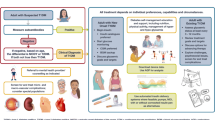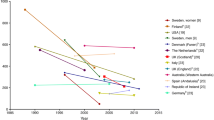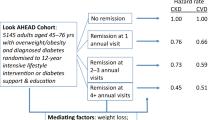Abstract
Background
Little information is available about the association of depression with long-term control of glycemia, blood pressure, or lipid levels in patients with diabetes.
Objective
To determine whether minor and major depression at study enrollment compared with no depression are associated with higher average HbA1c, systolic blood pressure (SBP) and LDL cholesterol over the long term in patients with an indication for or receiving drug treatment.
Design
Cohort study.
Patients
A total of 3,762 patients with type 2 diabetes mellitus enrolled in the Pathways Epidemiologic Study in 2001–2002 and followed for 5 years.
Main Measures
Depression was assessed at study enrollment using the Patient Health Questionnaire-9 (PHQ-9). SBP and information on cardiovascular co-morbidity were abstracted from medical records, and LDL cholesterol and HbA1c measured during clinical care were obtained from computerized laboratory data during a median of 4.8 years’ follow-up.
Key Results
Among those with an indication for or receiving drug treatment, after adjustment for demographic and clinical characteristics, average long-term HbA1c, SBP, and LDL cholesterol did not differ in patients with comorbid diabetes and minor or major depression compared with those with diabetes alone.
Conclusions
The adverse effect of depression on outcomes in patients with diabetes may not be mediated in large part by poorer glycemic, blood pressure, or lipid control. Further study is needed of the biologic effects of depression on patients with diabetes and their relation to adverse outcomes.



Similar content being viewed by others
References
Black SA, Markides KS, Ray LA. Depression predicts increased incidence of adverse health outcomes in older Mexican Americans with type 2 diabetes. Diabetes Care. 2003;26(10):2822–8.
Katon WJ, Rutter C, Simon G, et al. The association of comorbid depression with mortality in patients with type 2 diabetes. Diabetes Care. 2005;28(11):2668–72.
Katon W, Fan MY, Unutzer J, Taylor J, Pincus H, Schoenbaum M. Depression and diabetes: a potentially lethal combination. J Gen Intern Med. 2008;23(10):1571–5.
Lin EH, Heckbert SR, Rutter CM, et al. Depression and increased mortality in diabetes: unexpected causes of death. Ann Fam Med. 2009;7(5):414–21.
de Groot M, Anderson R, Freedland KE, Clouse RE, Lustman PJ. Association of depression and diabetes complications: a meta-analysis. Psychosom Med. 2001;63(4):619–30.
Lin EH, Katon W, Von Korff M, et al. Relationship of depression and diabetes self-care, medication adherence, and preventive care. Diabetes Care. 2004;27(9):2154–60.
Katon WJ, Simon G, Russo J, et al. Quality of depression care in a population-based sample of patients with diabetes and major depression. Med Care. 2004;42(12):1222–9.
Gilbody S, Richards D, Brealey S, Hewitt C. Screening for depression in medical settings with the Patient Health Questionnaire (PHQ): a diagnostic meta-analysis. J Gen Intern Med. 2007;22(11):1596–1602.
Kroenke K, Spitzer RL, Williams JB. The PHQ-9: validity of a brief depression severity measure. J Gen Intern Med. 2001;16(9):606–13.
Spitzer RL, Kroenke K, Williams JB. Validation and utility of a self-report version of PRIME-MD: the PHQ primary care study. Primary Care Evaluation of Mental Disorders. Patient Health Questionnaire. JAMA. 1999;282(18):1737–44.
Golden SH, Lazo M, Carnethon M, et al. Examining a bidirectional association between depressive symptoms and diabetes. JAMA. 2008;299(23):2751–9.
Gary TL, Baptiste-Roberts K, Crum RM, Cooper LA, Ford DE, Brancati FL. Changes in depressive symptoms and metabolic control over 3 years among African Americans with type 2 diabetes. Int J Psychiatry Med. 2005;35(4):377–82.
Richardson LK, Egede LE, Mueller M, Echols CL, Gebregziabher M. Longitudinal effects of depression on glycemic control in veterans with type 2 diabetes. Gen Hosp Psychiatry. 2008;30(6):509–14.
Von Korff M, Katon W, Lin EH, et al. Work disability among individuals with diabetes. Diabetes Care. 2005;28(6):1326–32.
Egede LE, Ellis C. The effects of depression on diabetes knowledge, diabetes self-management, and perceived control in indigent patients with type 2 diabetes. Diabetes Technol Ther. 2008;10(3):213–9.
Simon GE, Katon WJ, Lin EH, et al. Diabetes complications and depression as predictors of health service costs. Gen Hosp Psychiatry. 2005;27(5):344–51.
Joynt KE, Whellan DJ, O'Connor CM. Depression and cardiovascular disease: mechanisms of interaction. Biol Psychiatry. 2003;54(3):248–61.
Serebruany VL, Glassman AH, Malinin AI, et al. Enhanced platelet/endothelial activation in depressed patients with acute coronary syndromes: evidence from recent clinical trials. Blood Coagul Fibrinolysis. 2003;14(6):563–7.
Vaccarino V, Johnson BD, Sheps DS, et al. Depression, inflammation, and incident cardiovascular disease in women with suspected coronary ischemia: the National Heart, Lung, and Blood Institute-sponsored WISE study. J Am Coll Cardiol. 2007;50(21):2044–50.
Everson-Rose SA, Lewis TT, Karavolos K, Dugan SA, Wesley D, Powell LH. Depressive symptoms and increased visceral fat in middle-aged women. Psychosom Med. 2009;71(4):410–16.
Carney RM, Freedland KE, Miller GE, Jaffe AS. Depression as a risk factor for cardiac mortality and morbidity: a review of potential mechanisms. J Psychosom Res. 2002;53(4):897–902.
Acknowledgments
Supported by grant MH073686 from the National Institute of Mental Health, Bethesda, MD.
Conflict of interest
Dr. Ciechanowski is CEO and founder of Samepage, Inc., a consulting company providing services for improving patient-provider relationships; Dr. Lin has received honoraria from Health Star Communications and Prescott Medical; Dr. Katon has received honoraria for lectures from Wyeth, Lilly, Forest, and Pfizer, and is on advisory boards for Lilly and Wyeth; Dr. Von Korff has one grant to Group Health Research Institute funded by Johnson & Johnson and another grant pending.
Author information
Authors and Affiliations
Corresponding author
Additional information
Financial support: Supported by grant MH073686 from the National Institute of Mental Health, Bethesda, MD.
Rights and permissions
About this article
Cite this article
Heckbert, S.R., Rutter, C.M., Oliver, M. et al. Depression in Relation to Long-term Control of Glycemia, Blood Pressure, and Lipids in Patients with Diabetes. J GEN INTERN MED 25, 524–529 (2010). https://doi.org/10.1007/s11606-010-1272-6
Received:
Revised:
Accepted:
Published:
Issue Date:
DOI: https://doi.org/10.1007/s11606-010-1272-6




